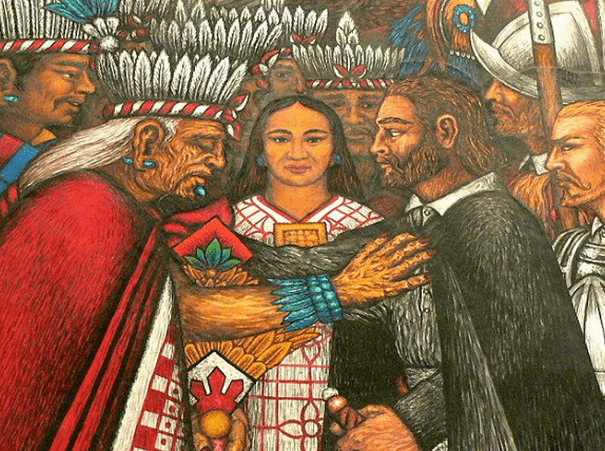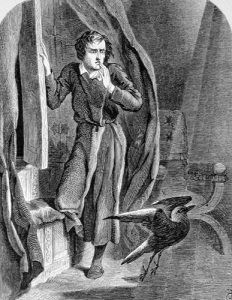Winner of the Fall 2016 StMU History Media Award for
Best Article in the Category of “People”
Best Article in the Category of “World History”
Largely due to the importation of disease and use of superior weapons, the Spaniards were able to conquer the Aztec capital of Tenochtitlan, kill the empire’s last emperor, Cuauhtémoc, and bring the Aztec empire to an end. Few know of La Malinche, the indigenous interpreter of Hernán Cortés, whose linguistic abilities were used to facilitate important conversations between the Spaniards and the indigenous leaders. Without the help of La Malinche, perhaps the Aztec empire would have survived.
Born between 1502 and 1505, La Malinche was named Malinalli Tenepal, the first part of her name being a Nahuatl term for the twelfth day of the month in correspondence to the Aztec calendar, and the second part of her name meaning “lively.” She was born of nobility in Paynala within the region of Veracruz. Her troubles started at a young age after the death of her father. La Malinche was ousted from her home to ensure her new half-brother received the inheritance of the family instead of her, since she was the eldest child. She was given to “some Indians of Xicalango.”1 Then the Indians gave her to a nobleman in Tobasco, a region in the Yucatan. When Cortés arrived to Tobasco, he was offered twenty slaves, one of them being La Malinche. Having lived in Veracruz, a Nahuatl-speaking region, and then being sold into a Maya-speaking region, La Malinche knew both languages and she was soon recognized for the linguistic talents that could benefit Cortés in his conquests.2

The few glimpses of La Malinche and how her presence as an interpreter accelerated the fall of the Aztec empire can be found in the writings of the Spanish explorers, specifically from Hernán Cortés, her “lord and master.”3 From the second letter Hernán Cortés wrote to Emperor Charles V, dated October 30, 1530, Cortés speaks of La Malinche as “a female interpreter that I had, who was a native of this country, and whom I obtained at Putunchún on the Rio Grande.”4 This confirms the vague aspects of her life that we already know. But most importantly, in this context, this letter goes on to tell of a scenario in which La Malinche saved the Spaniards from an ambush by the Cholulans. La Malinche was told by the wife of a native leader that they planned to attack the Spaniards and if La Malinche came with them, she would be protected. La Malinche delivered this message to Cortés, which ultimately led to the massacre of Cholula and provided a direct path to march towards Tenochitlan, the capital of the Aztec empire.5 This leads to the question of whether or not La Malinche was a traitor or a survivor. Did she explicitly want the Aztec empire to fall or did she just want to save herself from the carnage?
With no traces of primary sources from La Malinche herself, her story has been retold by various scholars without much consistency, nothing ever being certain. Up until the twentieth century, La Malinche was viewed as a traitor to her country Mexico. In 1861, on the celebration day of Mexico’s Independence, Ignacio “El Nigromante” Ramírez, a Mexican journalist, addressed the Mexican people by saying, “One of the mysteries of fate is that every Mexican owes his downfall and disgrace to a woman, and to another woman his salvation and glory; the myth of Eve and Mary is reproduced everywhere; we indignantly remember Cortés’s mistress and will never forget, in our gratitude to Doña María Josefa Ortiz.”6 La Malinche is seen as playing a key role in the subjugation of the Mexican peoples to Spain, while Doña María Josefa Ortiz did the contrary and liberated the country. However, many Chicana writers and modern scholars are trying to rewrite the tale of La Malinche to understand the complexities of her choices and to vindicate her. For example, Gloria Anzaldua promotes the idea that La Malinche had a “new consciousness,” that she voluntarily served as the interpreter of Cortés not only to save herself, but also because she knew that a new mestiza culture was going to be born (especially considering she had a son with Cortés in 1524).7 She made a conscious effort to exchange language and cultural aspects from each side in order to facilitate the emergence of the new mestiza society; however, with that came brutal consequences in the shape of warfare and mass death in the New World.
Whether or not La Malinche’s role as Cortés’s interpreter was traitorous, simply an effort to survive, or some other complex reason involving love for Cortés, hate for the Aztec empire for the cruelty she faced after being ousted from her home, or promotion of the new mestiza culture, no one will ever know the true story of the Indian, slave woman who traveled alongside Cortés towards the culmination of the Aztec empire.
- Bernal Castillo del Díaz, The Discovery and Conquest of Mexico, 1517-1521 rev. American ed., trans. A.P. Maudsley (New York: The Noonday Press, 1965), chap. 22-23. ↵
- Pilar Godayol, “Malintzin/ La Malinche/ Doña Marina: re-reading the myth of the treacherous translator,” Journal of Iberian and Latin American Studies 18, no. 1 (April 2012): 61-68. ↵
- Castillo del Bernal, chap 23. ↵
- Hernan Cortes to Emperor Charles V, October 30, 1520, in Letters of Despatches of Hernando Cortes, to the Emperor Charles V., trans. (New York: Wiley and Putnam, 1843), letter II. ↵
- Hernan Cortes to Emperor Charles V, October 30, 1520, in Letters of Despatches of Hernando Cortes, to the Emperor Charles V, letter II. ↵
- Rosario Pérez-Lagunes, “The Myth of La Malinche: From the Chronicles to Modern Mexican Theater” (PhD dis., Virginia Polytechnic Institute and State University, 2001), 24. Although she was of Spanish descent, Doña María Josefa Ortiz was born in Valladolid, Mexico in 1768 and identified herself as Mexican. She and her husband were both a part of the rebellion that ultimately led to Mexico’s independence from Spain in 1824. ↵
- Godayol, 68-70. ↵



230 comments
Azucena Cuevas
It is crazy to think that there could have been a chance for the survival of the Aztec empire if La Malinche had not betrayed them. I really enjoyed how detailed the article was and how it provided the different theories. I think on top of wanting to survive the Aztecs had mistreated her and sold her to Cortes only giving her more reason to betray them.
Olivia Tijerina
From the message we come to know of a significant woman whom was responsible for the victory of Spaniards and the fall of the very powerful Aztec empire. This woman was named La Malinche whose place was it to be a translator as being apart of a slave to the Spaniards. More significantly is the event where knowing upon an attack of the Aztec against the Spaniards. The turning point was that La Malinche would be the one to give the Spaniards a heads up of the future even and the Spaniards responded by being the first to attack. Overall, La Malinche contributed tremendously to change and dictate the resulting events.
Nelly Perez
La Malinche was a player on both teams. She took advantage of it only by twisting their words. She could have used them more wisely, except she chose not to. She saved the Spaniards from an ambush that she could have helped her people plot out. She back-stabbed both teams. What if she just did it to get them to be quiet or find a way to get them what they wanted?
Kenneth Gilley
What an interesting article! La Malinche seems to have been both a traitor and a survivor at the same time. It is true that she betrayed her country by helping Cortes and informing him of the Cholulan plan to attack him and his men. However, La Malinche also seemed to just be try to escape carnage and destruction. There may have been other factors that we do not know about that influenced her decisions. Either way, she certainly played an important role in the history of the Americas.
Eliezer Leal
What an interesting article. I had never heard of La Malinche before. Although I am not really sure where I land on if she was in the right for what she did to the Aztecs or if she was in the wrong. The article even says no one knows for sure why she did what she did so I personally think no one has a solid reason to hate and or judge her for her decisions.
Vania Gonzalez
La Malinche was a survivor and a traitor because yes she did betray her own people and in a way led them to their destruction but those same people also treated her bad and the spaniards gave her a home, somewhere she felt safe because her own people had her in slavery. La Malinche may have thought of herself which is wrong but how could she not side with someone who was treating her better than her own people.
Margaret Maguire
This article was really neat. La Malinche was part of both sides, the Aztecs and the Spanish. She had such a big impact on what happened during the disagreement between the two sides. She was the translator for the Spanish when they talked with the Aztecs. The Aztecs told her that the planned to attack the Spanish and she probably told them to make sure she didn’t get hurt. I thought that this story had a really interesting events I never knew about La Malinche or her story before reading this article.
Vanessa Quetzeri
I find this article interesting because there are various motives as to why La Malinche would have informed Cortes about the ambush by the Cholulans. One will never really know, but as a kid, she was sent from place to place and never really found a purpose or permanent home. So, if seen from that point of view, it could have been the comfort and validation she felt as an interpreter for the Spaniards.
Michael Thompson
This is a fun story, in a way. I think it’s weird knowing that one person who had such a menial task had such an impact like La Malinche. I would like to know what was going through her mind when she was making these decisions. Did she consider that she was going against her people? Was she just doing it out of loyalty to her master, and if not why? Did she know what she was really doing? It would clear a lot of things up for sure, history wise.
Cristianna Tovar
After reading this article, I have formulated my opinion on whether I think that La Malinche is a traitor or not. I believe that she was in love with Cortes and wanted to protect him at all costs. The fact that the wife of a Native leader told La Malinche that they were going to attack the Spaniards and that she could go with them and be protected, yet La Malinche reject their offer and told Cortes, reveals to me that she had his best interest at heart. For this reason, I do not think that La Malinche was a traitor. Rather, I think that she was a powerful individual who stood up for those that she loved.